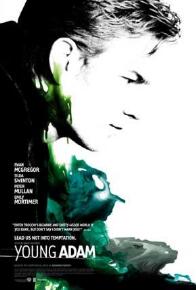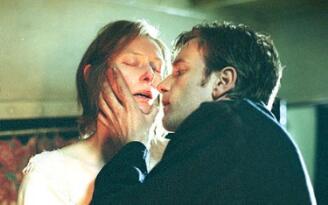Young Adam: From Its Premiere at the Edinburgh Film Festival
by roberta a. joppolo
Note: This article has been translated from its original Italian by the author; read the Italian version here.)
 Ewan McGregor, the main star of the movie Young Adam by Scottish director David Mackenzie, which was presented as the opening screening at the Edinburgh Film Festival, wasn't able to attend the premiere due to his busy filming schedule on the set of Episode III of the Star Wars series at the Fox Studios down there in Sidney, Australia. Of course that was a sore disappointment for those who gathered at the UGC Cinema Complex in Fountainbridge, where the premiere took place. As with its first screening at this year's Cannes Film Festival in May, Young Adam got a great reception from all of the people in the audience, as well as positive reviews by journalists and reporters and by the many moviegoers who came up there in beautiful Scotland and had the great pleasure of enjoying a terrific and very artistic piece of cinema.
Ewan McGregor, the main star of the movie Young Adam by Scottish director David Mackenzie, which was presented as the opening screening at the Edinburgh Film Festival, wasn't able to attend the premiere due to his busy filming schedule on the set of Episode III of the Star Wars series at the Fox Studios down there in Sidney, Australia. Of course that was a sore disappointment for those who gathered at the UGC Cinema Complex in Fountainbridge, where the premiere took place. As with its first screening at this year's Cannes Film Festival in May, Young Adam got a great reception from all of the people in the audience, as well as positive reviews by journalists and reporters and by the many moviegoers who came up there in beautiful Scotland and had the great pleasure of enjoying a terrific and very artistic piece of cinema.
Though Ewan McGregor is the real star of the film, all the cast is at its best, with the direction and guide of the very talented David Mackenzie, who must have been really inspired to make such a stunning job, a real work of art. The film has indeed met all of the expectations the wait for it had created around itself. Even if the story is not one to lift everyone's spirit and make people feel good at its ending, it is certainly something that has been worth waiting for.
For 98 minutes the audience was amazingly kept in silence, quite unusual at a premiere screening. Then, once the lights came on again, the enthusiasm was definitely expressed to those who made it all possible: director David Mackenzie, actor Peter Mullan, actress Emily Mortimer as well as producer Jeremy Thomas and Ewan's proud mother, Carol McGregor, and granny.
Ewan McGregor (Joe) and Peter Mullan (Les) are two Glaswegian bargemen who punt coal up and down the Clyde Canal, between Glasgow and Edinburgh. They don't have much in common but in some way they link and connect to each other even through their long silences. In the opening scene of the film we find them struggling to fish the body of an almost naked girl out of the canal. All of a sudden the news reaches the local paper and the new macabre celebrity brings some unexpected excitement as the manner of the death slowly emerges and, at the same time, haunts the lives of the characters, revealing unusual aspects of their own queer personalities and reactions. The story evolves creating some kind of tension when a man is charged with murder. But this doesn't much affect Mullan, who's actually almost happy to have to testify at the trial, nor McGregor who hardly flinches and makes his way back to the barge to make love to Mullan's frustrated wife, Tilda Swinton (Ella). The deceptive air of calm gradually matures into tragedy, as we discover through a very significant flashback structure just what demons may hide behind Joe's inscrutable expression. Like its anti-hero, the film is capable of seducing without compromising its mystery.
Right after the closing credits of the film, the main feeling you could sense around was people being overwhelmed by it, by its forthrightness and the severe harsh reality which the film carried all along with it. No particular tension is ever there; on the contrary, the main feeling which clearly emerges is a huge sense of loss. At first it's a kind of concrete loss, just like being held up in the air by something strong and indistinct that makes it impossible for you to reach the ground down under, so close and yet so far away. Suddenly, just like it happens in the story on the screen, you feel drained and empty simply by the complete loss of emotion, which is exactly what mainly stays with you as the story ends. Just like in the novel itself, same as Alexander Trocchi meant people to feel after reading his book.
Lost of emotion, spirituality, mutual respect, morality and mostly, loss of conscience. The very worst thing that can ever happen to a man, the very loss of his soul. Down from a dusty and bleak surface all things become covered by the muddy water of the canal and lay there on the bottom, motionless. At once nothing is left out of the water to attract people's attention, but to the good eye it's all still there, very visible just like big oil stains on walls. In a way this very dark piece of cinema evokes memories of the neo realism era of the movies, giving us true hope for a new coming wave of it. Praise to this young and brave director, who even the author himself, the late Alexander Trocchi, would be proud of, since Mackenzie masterfully outdid himself, respecting the original plot and keeping faithful to what the writer meant to say with his novel.
In this dark and sorrowful atmosphere a few visual moments reach true poetry: the elegant swimming of a white swan on the water of the canal, the soft touch of a coal-stained hand lightly lowered on the white wet skin of the back of the woman's corpse and the sweetest whispering of a name, 'Cathie', softly said to express uncommunicable sorrow, pain and even love. Just perfect is the choice of the cold palette of grey, blues and greens blending together, the beautiful contrast created by its warmer photography captions and the chilly tones of the music, composed by David Byrne, which is always there wrapping, weakly at first, and then with a more powerful sound, the sequence of the events.
 All of the cast, I dare say, is stellar and marvellous and the acting is sublime: from Tilda Swinton as Ella, who is certainly in her best-performed role to date, playing a very dull, flat character and still able to deliver a very intense and erotic portrait of a woman, to Peter Mullan's Les' deepest silence, and Emily Mortimer's Cathie. But who really deserve a standing ovation is definitely Ewan McGregor. He masterly lowers himself into Joe's character, giving an outstanding interpretation; honestly it's the very best he's delivered so far. He magnetizes and draws you into his character and you can't help but liking this unmoral young man who's losing, along with all he has ever had before, what is left of his own soul. By doing that, he reminds you that he is capable of much more than flashing out his notorious charming smile. McGregor becomes Joe, the drifter, and like it or not, he's Joe, nothing else but Joe. Recognising his best role he has had in years, he stretches his skills with precise attention, craft and wise restraint. It's a career changing performance in what is likely to stand as one of the best British films to date. Ewan's tremendous skills in playing Joe Taylor easily capture you, making you wish you would be there too, the thing at the very end of his long fingers. Personal opinion apart, let's applaud his daring, artistic and certainly his finest, most intriguing and difficult performance to date.
All of the cast, I dare say, is stellar and marvellous and the acting is sublime: from Tilda Swinton as Ella, who is certainly in her best-performed role to date, playing a very dull, flat character and still able to deliver a very intense and erotic portrait of a woman, to Peter Mullan's Les' deepest silence, and Emily Mortimer's Cathie. But who really deserve a standing ovation is definitely Ewan McGregor. He masterly lowers himself into Joe's character, giving an outstanding interpretation; honestly it's the very best he's delivered so far. He magnetizes and draws you into his character and you can't help but liking this unmoral young man who's losing, along with all he has ever had before, what is left of his own soul. By doing that, he reminds you that he is capable of much more than flashing out his notorious charming smile. McGregor becomes Joe, the drifter, and like it or not, he's Joe, nothing else but Joe. Recognising his best role he has had in years, he stretches his skills with precise attention, craft and wise restraint. It's a career changing performance in what is likely to stand as one of the best British films to date. Ewan's tremendous skills in playing Joe Taylor easily capture you, making you wish you would be there too, the thing at the very end of his long fingers. Personal opinion apart, let's applaud his daring, artistic and certainly his finest, most intriguing and difficult performance to date.
There's a huge amount of sex in the film, gritty and solemn rather than idealised, and it reaches its peak in a quite bleak and disturbing sequence which involves custard, ketchup, ink and flour. But, what in the end emerges and strikes you as well is that none of that has been gratuitous, but it's all useful to tell us about the characters' morality decline. Like the novel, there's not much dialogue among the characters, who mainly communicate to each other through the intense expressions of their eyes and their significant actions. The sex here is indeed another a very meaningful way to tell the story.
****1/2 (of 5)
{See Anna Battista's interview with David Mackenize from the January 2003 issue}
Copyright (c) 2005 erasing clouds |
|